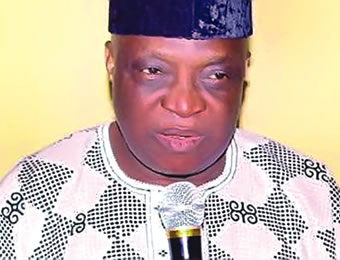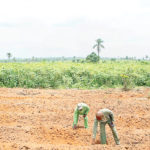The responses elicited from Olufemi Obafemi when asked about the roles of a dramatist or a creative artiste in the development of their immediate society are inspiring. People can quickly identify with a medical doctor’s job, but not many individuals know the roles that creative professionals play in society. To many of their audience, dramatists and literary scholars are mere entertainers whose relevance ends with their ability to make them laugh. However, the social and cultural engineering activities that people in the drama or entertainment industry undertake as their responsibility goes beyond their commitment to providing comic relief to the burdened society or interlude to the barrage of social challenges. They have self-assigned to themselves the duty of serving as the society’s conscience while also being known as the eyes of their cultural identity, seeing far into the future and making necessary indications to encourage planning and avoid imminent melancholy. Even when their role is primarily unnoticed, they remain dedicated to their profession with a fantastic work ethic. Obafemi belongs to this category, and from his response, one can deduce the assortment of the ideas he has lent to society through his works. A number of these would be extensively discussed in what follows.
Theatre professionals demonstrate their competence when they organize social experiences and convert them to consumable contents that shape people’s understanding of the complexity of human existence. Through this, their audience imagines themselves in the work of art they are digesting. This is because society is the minefield where the activities shown in the creation of art are drawn. Since the readers or the audience can easily relate to the issues and ideas discussed, they become active participants in their consuming works. This is where the entertaining characteristic of literary productions emerges. A dramatist who adapts the story of a wife constantly abused by her husband has perhaps done so to achieve any of the following aims. One, the writer exposes the gender inequity inherent in the patriarchal structure of their society. Two, while doing this, the writer captures the repressed aspirations of women in such a society. Equally, the intermittent injection of comic relief into the text entertains the audience while the message is passed across. But for a non-professional, their understanding of the text could have ended in the area of entertainment.
Incidentally, Obafemi is both a literary writer and a scholar critic. More importantly, he has remained successful in the two domains. As a literary critic, Obafemi’s cardinal philosophy of evaluating a work of art is to consider its practical import. As an African literary artist or creative writer, the crass obsession with nature does not have a place in African works because writers are meant to address society’s ills and bring them to redress. Writers in the continent do not write just for pleasure. They are bound by some social responsibility to reveal what they face as a people and civilization so that their welfare will receive appropriate attention. African countries are ravaged by insecurity, disease, economic degradation, political insincerity, among many other things. Therefore, it is only logical that intellectuals, especially those from the literary sphere, reflect these challenges in their works to be projected to places not imagined. This is what Obafemi has been doing in his criticisms. In other words, it measures the appropriateness of a particular work of art concerning how it can reflect the people’s sociopolitical conditions under severe sociopolitical conditions. When books satisfy these preconditions, they would be seen as contextually fitting and socially significant to society.
By investigating writers’ works regarding their ideological standings, sociocultural, and sociopolitical exigencies, Obafemi has been recognized as an impartial critic whose judgment of literary material is informed by objective scholarship. To get to this position in academic engagement means one is vast enough in the knowledge of literary theories that are canonized globally. Theories are to literary critics what syringes are to doctors or what gasoline is to every car owner. The former would find it extremely difficult to provide medical services to patients without the mentioned instrument, while the latter would make no observable move without gasoline. Theories are the abstract mechanisms through which literary works are evaluated and appreciated. It is commendable to know that Obafemi has a good mastery of the theories associated with an academic scholarship. He has deployed them in his intellectual examinations and evaluation of the works produced by different scholars. It is also noteworthy that being accustomed to criticism enables one to understand people’s political and economic composition, contributing to society’s configuration.
Critics are, by this profession, expert social scientists who reflect on the emerging discourse available in a text to understudy the society and arrive at informed conclusions about things. Looking at the technical aspect of their works as passively mentioned above, one can ask how they are considered nationally significant to their development. To such curious minds, Obafemi states that their trade is appreciated by individuals who can establish the connection between their works and society. For example, the critic understudies a work of art and brings out society’s economic structures responsible for distributing wealth to steer society’s trajectory in a specific direction. He looks at the instances of capitalist culture and how it has been the basis of the social relationships between different classes in society. From there, the critic can be predictive of such a society’s future, making informed projections about the probable outcome of an excessively capitalist adventure and its disposition to birth an overly chaotic and generally detached society that does not cater to the well-being of an average individual. As consumers of such scholar-critic works, one would understand that the society reflected in the writings is sitting on a keg of gunpowder, waiting for an explosion at the slightest provocation. Such works will become exceptionally informative because they would reveal the oddity involved in the appropriation of any philosophy in the running of society’s affairs. Still, they would also show the intricacies of human relationships encouraged by such society’s forms of ideas. Whatever the critic shows would become the basis for measuring the society to understand what is most suitable.
As a creative writer, however, the above system’s internalization helps create his artistic productions. Obafemi belongs to a school of scholars who appreciates works of art by using a series of theoretical models as a guide, so it becomes relatively significant to use them in his artistic creations. He is aware that the successful sustenance of the audience’s attention lies in providing sequential and captivating results because that would be the basis for getting their unalloyed attention. This inevitably places a level of pressure on him and every committed artist like him. For reasons that are not unconnected to their desire to carry the audience along, writers must conduct an accurate feasibility study of their intending audience so that the materials handed down would make maximum impact. For example, suppose one targets to write about the moral decadence evident in loose or indecent dressing that has perforated contemporary time’s moral architecture; in that case, the most suitable audience for such work is the youth demographic, who are experiencing the process of enculturation. Therefore, it places some responsibility on the writer to consider the age bracket’s language peculiarity to achieve the predetermined goals. Informed critics, who are also creative writers, understand their works’ enormity in this sense, and they always stand up to the responsibility.
As a result, what the artiste is doing is no less than a leader’s work because literary works simulate leadership roles in many different ways. For one, the audience whose intention is strictly entertainment would not be forsaken at the behest of others whose concern is didactic or moralistic fervor. Thus, it is incumbent on the dramatist to factor in the audience’s concerns so that none of them would have reasons to despise his/her intellectual productions. Apart from the fact that this places much responsibility on the producers of these works, it also brings out their leadership capabilities. This is where Obafemi’s message becomes more explicit. The onus of leadership lies in responding to diverse and differing opinions without making either side feel disrespected. Here, the emphasis is mainly on managing diversity and various views, especially about the world’s current sociopolitical conditions.
At the intersection between globalization and civilization is the responsibility to update one’s attitude to accommodate human society’s changing dynamics. Individuals from different sociopolitical backgrounds look up to leadership to provide solutions to their existential challenges and expanding issues. This is one of the numerous lessons that being a dramatist has taught Obafemi. It, therefore, justifies the thematic and ideological focus around which his works are circumscribed. Although it is clear from literary scholars’ efforts that behind the production of celebrated works of art is an eternal circle of activities that authors indulge in to bring satisfaction to the audience, it comes at a personal cost.
In most cases, they would have to sacrifice their time and leisure to explore all the possible ways to ensure that their audience is satisfactorily catered for. They view their profession as a means of achieving humanity’s ultimate plan, which is to lighten up people’s lives through their works. While they are duty-bound to make sure that their audience across every setting is sufficiently catered for, they equally must check that they do not sacrifice truth-telling, originality, and ethics in the process so that the quality of their works would not be questioned. They must understand that beyond their desire to ensure that their audience gets maximum satisfaction is the social responsibility to x-ray what is happening in their society through their creativity. A society that is corrupt to an unimaginable proportion or plagued by insecurity caused by the inability to manage its territorial integrity will not be consummately rebranded as if nothing is wrong with its political system. As much as their profession binds them to reduce the social pressure and burden placed on them, they are equally expected to showcase the environment’s downsides through their works.
When asked about the possible solutions out of the woods for Africans, Obafemi is very pragmatic and analytical. Like many African scholars, he traces Africa’s underdevelopment to the western imperial system that has erected a barrier to African’s access to their potentials. He laments that this wall was laid during slavery and was succeeded by its destructive accomplices like colonization, neocolonialism, and the contemporary neoliberal economy tailored to exploit Africa and Africans. Being trapped in the middle of nowhere is a condition traceable to Africa’s recent European relationship. For people whose human capital was extracted for more than four centuries, it is impossible that the consequences would not be subsequently seen in their public life. During slavery, the continent’s best hands were forcefully displaced because of the force of expansionist ideologues. Having left their home countries hurriedly, they became outcasts in two different civilizations. Those left behind suffered a psychological backlash from the experience and became incapacitated by their people’s forceful extraction. This would be immediately followed by the colonization agenda where the colonial powers indiscriminately seized Africa’s political institutions and structures.
The continuation of exploitation during colonialism sent Africa centuries back in the development trajectory. Having their political system controlled by the imperialists meant that their natural resources were taken in overflowing abundance. In the process, their institutions worked essentially for the West, to the misfortune of African countries. The assignment of domination and subjugation was in place with colonial infrastructure as its economic and political life subsumed under a foreign one. Therefore, the combination of slavery and colonialism became so poisonous for the people that it comfortably inhibited them from growing maximally. Consequently, every African country, without exception, became vulnerable to economic and cultural predation because they were exposed to activities that critically challenged them beyond what they could handle.
More than a hundred years of dominance meant that these African countries lost touch with authentic or representational leadership and suffered mainly from the experience. They were neither represented nor given the necessary platform to determine their future. The people’s anger was used as a motivation to challenge colonialism’s structures to have access to their own natural and human resources without being placed at the subordinate position for which they have been known in recent time. However, the prospect was ominous because it seemed that the colonial powers had mastered the act of infringing upon the people’s resources by proxy.
The era of neocolonialism began. During the post-independence period, emerging African leaders became willing collaborators with Western imperialists. They offered themselves as conduits for the continuous exploitation and despoliation of African resources. With a tempting financial and political offer, post-independence African leaders succumbed to the colonial Europeans’ pressure and conceded to the unholy demand of sabotaging African development. It was almost unbelievable that the people who should have been the cornerstones of African transformation, despite their awareness of the long-lasting dehumanization that their forebears suffered under the same colonial systems, erected a mercantile political structure in the post-independence period where significant positions and juicy appointments were reserved for the highest bidders. As implied by Obafemi’s response, all of this entangled African progress and civilization because it mushroomed into something bigger incapable of being handled without extreme diplomacy. Heightened by globalization’s pressure, the African people became lost and were constantly in a state of flux. They did not have a central philosophy with which their civilization can be developed or launched. Indeed, constructing an effective solution becomes part of the problem.
According to Obafemi, what is needed to combat these existential challenges, having understood that the burden of solutions lies with forward-looking individuals, is to develop the right set of leaders who understands the import of shared leadership. Leadership attracts the necessary encomium whenever something is done correctly, just as it receives criticism for a society moving in a purposeless direction. Thus, understanding this places a responsibility on the leaders to develop the right frame of mind to combat the continent’s problem. To do this, the class stratification that has become a part of African culture must be carefully and effectively dismantled. The existence of class presupposes that it would be subject to intimidation. The upper-class occupants would find sufficient reason to challenge those in the middle class, who would, in turn, scout the lower class to flex their muscles against. All of these are a means of weakening social infrastructures, which would have a detrimental effect.
As a realist, Obafemi concludes that Africa still has the potential to leapfrog others in the development index if it quickly works towards translating its human and natural potential into tangible results. This can be achieved by having a structured plan towards growth because it is important to define one’s trajectory of development against going into the unseen future without active plans. To do this, one needs vision, driven by incurably patriotic sets of leaders who would accept the duty of advancing the society as natural and generous. Leaders who cater more to their elitist group above the vast majority of people would have difficulty transforming humanity into something exceptional. Representational leadership starts from how leaders prioritize the people and how they conduct themselves. The ones who prioritize the people above themselves would consider the masses’ welfare as primary and not negotiable. When these leaders occupy the various leadership seats in the continent, they will begin to untangle the colonial and neocolonial web, thereby giving the continent a clear direction.
YOU SHOULD NOT MISS THESE HEADLINES FROM NIGERIAN TRIBUNE
Cryptocurrency: Understanding The Craze, Threat
ON Friday, February 6, the Central Bank of Nigeria (CBN) rocked the boat with a circular that inadvertently highlighted how popular cryptocurrency transactions have become among Nigerians in recent years, judging by…
ICYMI: Yoruba, Hausa Teachers Needed In US
The US Embassy and Consulate in Nigeria has announced that the services of Yoruba and Hausa teachers are needed in the United States. According to the Public Affairs Section of the US Mission Nigeria…
Controversy Over Man Who Jumped From 7th Floor Of 1004 During EFCC Raid
The police in Lagos State have begun investigations into the circumstances surrounding the alleged death of a man at 1004 Estate, Victoria Island, who allegedly jumped from the 7th floor of one of the buildings. The man was…
INEC Lists Five Challenges Ahead Of 2023 Elections
AS politicians step up horse-trading ahead of subsequent elections, the Independent National Electoral Commission (INEC) has listed five main areas of likely challenges…
After Two Years, Daddy Freeze Apologises To Bishop Oyedepo
Daddy Freeze whose real name is Ifedayo Olarinde has apologised to Bishop Oyedepo who is the presiding bishop and founder of Living Faith Church aka Winners Chapel…






